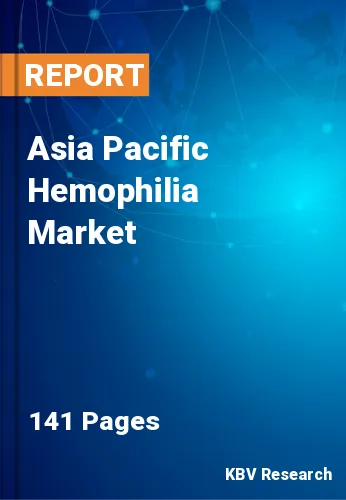The Asia Pacific Hemophilia Market would witness market growth of 7.4% CAGR during the forecast period (2023-2030).
More than 7,000 Australians have been identified with a bleeding problem, according to the Haemophilia Foundation Australia. Leading market participants are receiving lucrative growth prospects as a result of the illness's increased diagnosis rate as well as the expanding popularity of preventative treatments to treat hemophilia. Additionally, numerous campaigns are being organized by governing bodies in various nations to raise awareness of the advantages of early diagnosis and the need to follow the right processes to enable the early screening of newborns, which is encouraging market growth.
By 2024 and 2030, respectively, India Brand Equity Foundation (IBEF) projects that the Indian pharmaceutical market will be worth $65 billion and $130 billion. India currently has a $50 billion pharmaceutical sector. India exports pharmaceuticals to more than 200 nations, making it a significant global exporter of these products. A mean industrial production index of 221.6 was recorded for the fiscal year 2021–2022 in the pharmaceutical, chemical, and botanical product industries. In 2021–2022, $24.6 billion was exported in pharmaceutical and medical products. In addition, the most recent data from the National Health Accounts (NHA) 2022 report from Niti Aayog revealed that India's government health expenditure (GHE) amounted to 1.35% of the country's overall GDP in 2019–20.
Asia Pacific experienced a substantial increase in the proportion of overweight and obese persons over the past 20 years in addition to its rapid expansion. According to the Asian Development Bank, over 40.9% of the adult population in this region is overweight, according to recent statistics. It is commonly recognized that being overweight and obese increases the chance of developing non-communicable diseases. Therefore, the quick rise in excess weight points to significant increases in the costs to the economy and healthcare systems. As a result, the market will expand quickly over the forecast period.
The China market dominated the Asia Pacific Hemophilia Market by Country in 2022, and would continue to be a dominant market till 2030; thereby, achieving a market value of $1,130.2 million by 2030. The Japan market is registering a CAGR of 6.7% during (2023 - 2030). Additionally, The India market would showcase a CAGR of 8% during (2023 - 2030).
Based on Distribution Channel, the market is segmented into Specialty Pharmacies, and Hospital Pharmacies. Based on Type, the market is segmented into Hemophilia A, Hemophilia B, and Others. Based on Treatment Type, the market is segmented into Prophylaxis, On-demand, and Cure. Based on Therapy, the market is segmented into Factor Replacement Therapy (Recombinant Factor Concentrates, and Plasma-derived Factor Concentrates), Desmopressin & Fibrin Sealants, and Gene Therapy & Monoclonal Antibodies. Based on countries, the market is segmented into China, Japan, India, South Korea, Singapore, Malaysia, and Rest of Asia Pacific.
Free Valuable Insights: The Worldwide Hemophilia Market is Projected to reach USD 18.3 Billion by 2030, at a CAGR of 6.2%
The market research report covers the analysis of key stake holders of the market. Key companies profiled in the report include Takeda Pharmaceutical Company Limited, CSL Limited (CSL Behring), Pfizer, Inc., Bayer AG, F. Hoffmann-La Roche Ltd., Novo Nordisk A/S, Octapharma AG, BioMarin Pharmaceutical Inc., Swedish Orphan Biovitrum AB (Investor AB) and Sanofi S.A.
By Distribution Channel
By Type
By Treatment Type
By Therapy
By Country
Our team of dedicated experts can provide you with attractive expansion opportunities for your business.

